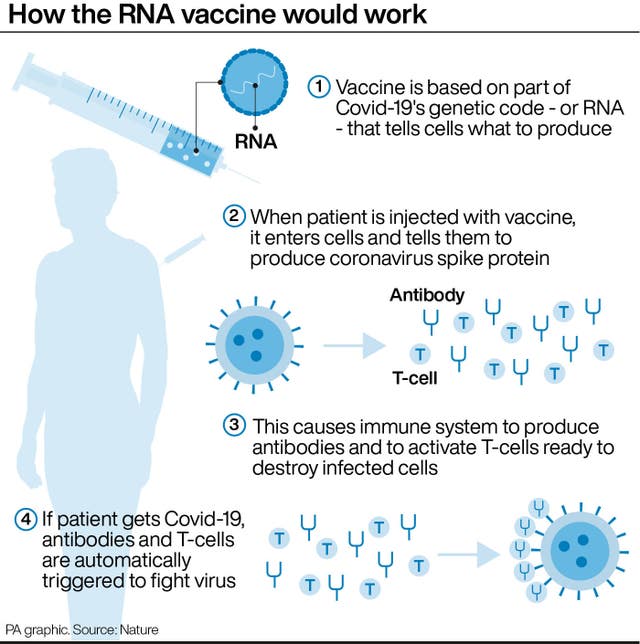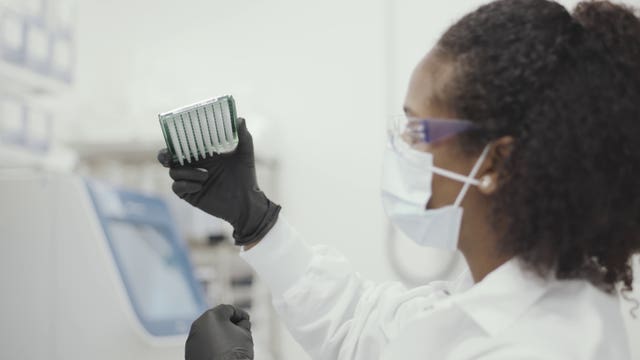
US company Moderna has announced its coronavirus vaccine may be 94.5 per cent effective against Covid-19.
One week after Pfizer and BioNTech announced their vaccine candidate has an efficacy of 90 per cent, Moderna has released its interim trial results.
But what exactly is the vaccine and what does it mean for you? Here's what we know so far.
How does the vaccine work?
The Moderna jab is a messenger RNA (mRNA) vaccine.
Conventional vaccines are produced using weakened forms of the virus, but mRNAs use only the virus’s genetic code.
An mRNA vaccine is injected into the body, where it enters cells and tells them to create antigens.
These antigens are recognised by the immune system and prepare it to fight coronavirus.
No actual virus is needed to create an mRNA vaccine. This means the rate at which the vaccine can be produced is accelerated.
What are the early results?
More than 30,000 people in the US took part from a wide range of age groups and ethnic backgrounds.
Two doses were given, 28 days apart, so researchers could evaluate safety and any reaction to the vaccine.
The analysis included 95 participants with confirmed cases of Covid-19, of which 90 had received the placebo and five the active vaccine.
Moderna also released data relating to severe cases, saying the interim analysis included 11 such patients.
All 11 severe cases occurred in the placebo group and none in the group which had received the vaccine, known currently as mRNA-1273.
Is the vaccine safe?
We just announced that mRNA-1273, our COVID-19 vaccine candidate, has met its primary efficacy endpoint in the first interim analysis of the Phase 3 COVE study.Read more: https://t.co/vYWEy8CKCv pic.twitter.com/YuLubU1tlx
— Moderna (@moderna_tx) November 16, 2020
Moderna said its available safety data does not indicate any significant safety concerns.
Their trials found the vaccine was generally safe and well tolerated, and the majority of adverse events were mild or moderate in severity.
Severe events after the first dose included injection-site pain and after the second dose included fatigue, myalgia (muscle pain), arthralgia (joint pain), headache, other pain, and redness at the injection site.
But these were generally short-lived.
Will life go straight back to normal?
No. The results are interim and the vaccine has not yet received regulatory approval.
It is still not known how long immunity will last, and trial participants will need to be followed for some time before this can be determined.
And the data on how effective the vaccine is in older adults – those most vulnerable to Covid-19 – is limited.
Experts say the vaccine will only be one tool in the fight against the pandemic, and public health measures like social distancing and hand-washing will have to continue for the time being.

Will people in the UK have access to the vaccine?
The Moderna vaccine is not one the UK has secured access to.
However, the Government has confirmed it is in discussions with the US company to “ensure UK access” but any doses would not be available until spring 2021 “at the earliest”.
Is the Moderna vaccine similar to the Pfizer/BioNTech candidate?
Both vaccines are based on the mRNA technology.
The preliminary data suggests the Pfizer vaccine offers around 90% protection against Covid-19, and Moderna’s results suggest 94.5% effectiveness.
But both sets of researchers say their trials are ongoing and the final numbers could change.
One big difference between the two vaccine candidates is how they need to be stored.
The Pfizer/BioNTech vaccine needs to kept at minus 70C (minus 94F), which could pose transport and storage issues.
 A scientist working on the Moderna coronavirus vaccine
A scientist working on the Moderna coronavirus vaccine
Moderna says its vaccine is expected to remain stable at standard refrigerator temperatures of 2C to 8C (36F to 46F) for 30 days, up from a previous estimate of seven days.
The company says mRNA-1273 can be distributed using widely available vaccine delivery and storage infrastructure and no dilution is required prior to vaccination.
Professor Trudie Lang, who runs the Global Health Network at the University of Oxford, suggested it was unusual to have a “pipeline” of so many vaccine candidates in development.
“She told BBC News: “We’ve got these two messenger RNA vaccines through now and there are other technologies hopefully coming through.
“And it would be a fantastic position to be in to have, you know, maybe three or four different vaccines that come through over the next coming weeks and months, and can maybe even do slightly different jobs, but certainly assure supply around the world.”



Why are you making commenting on The Herald only available to subscribers?
It should have been a safe space for informed debate, somewhere for readers to discuss issues around the biggest stories of the day, but all too often the below the line comments on most websites have become bogged down by off-topic discussions and abuse.
heraldscotland.com is tackling this problem by allowing only subscribers to comment.
We are doing this to improve the experience for our loyal readers and we believe it will reduce the ability of trolls and troublemakers, who occasionally find their way onto our site, to abuse our journalists and readers. We also hope it will help the comments section fulfil its promise as a part of Scotland's conversation with itself.
We are lucky at The Herald. We are read by an informed, educated readership who can add their knowledge and insights to our stories.
That is invaluable.
We are making the subscriber-only change to support our valued readers, who tell us they don't want the site cluttered up with irrelevant comments, untruths and abuse.
In the past, the journalist’s job was to collect and distribute information to the audience. Technology means that readers can shape a discussion. We look forward to hearing from you on heraldscotland.com
Comments & Moderation
Readers’ comments: You are personally liable for the content of any comments you upload to this website, so please act responsibly. We do not pre-moderate or monitor readers’ comments appearing on our websites, but we do post-moderate in response to complaints we receive or otherwise when a potential problem comes to our attention. You can make a complaint by using the ‘report this post’ link . We may then apply our discretion under the user terms to amend or delete comments.
Post moderation is undertaken full-time 9am-6pm on weekdays, and on a part-time basis outwith those hours.
Read the rules hereLast Updated:
Report this comment Cancel